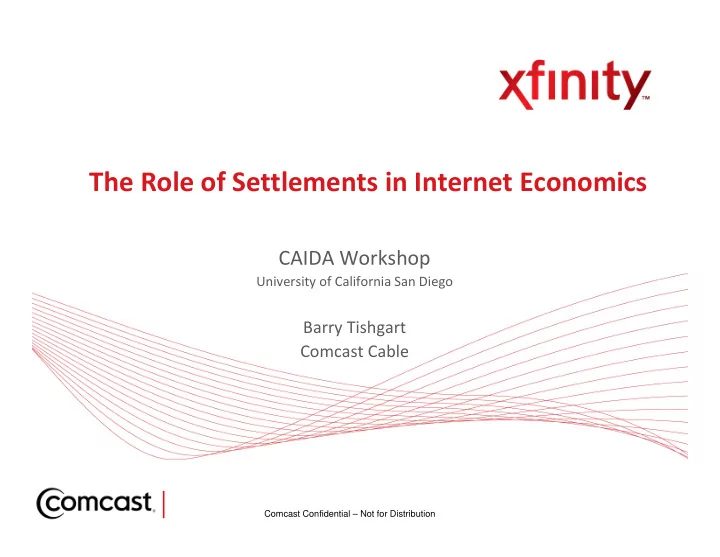

The Role of Settlements in Internet Economics CAIDA Workshop University of California San Diego Barry Tishgart Comcast Cable Comcast Confidential – Not for Distribution
Economics and Internet Interconnect • Firms Participating in the Internet Ecosystem Rationally Adhere to Basic Microeconomic Theory such as the Production Curve, Q = f(L,K) • There are Many Complex Models Derived from this Theory but let’s Focus on Production, Inputs and Outputs • Outputs – Consider a Sample of What Our Colleagues Produce and Sell • Internet Transit • Content Delivery and Related Value Added Services • Web ‐ Hosting and Storage • Consumer and Business Internet Services • PaaS, SaaS, IaaS • Applications, Search, Gaming, Social Networking, etc. • Inputs • Labor • Capital • Fixed and Variable Costs Including Internet Interconnect 2 Comcast Confidential – Not For Distribution
Economies of Scale • Companies in the Internet Ecosystem Often Achieve Economies of Scale ( when long ‐ run total costs decline as output increases ) Faster than Other Industries. • Historically this has Been the Case • Factors such as Moore’s Law, Metcalf’s Law, Automation, Reach and Productivity Enable More Rapid Unit Costs Declines • Firms will seek to minimize SATC and LATC with the goal of aligning costs with product/service quality and marketability • Along with Total Costs (TC), Supply and Demand and Pricing all factor into TC = FC + VC Profitability of the Firm. ATC = TC/Q 3 Comcast Confidential – Not For Distribution
Interconnect as an Input • Internet Businesses that Move Large Amounts of Traffic Depend on Interconnect as a “Product Input.” • Internet Interconnect includes Peering and Commercial Relationships. • Nearly all Settled Arrangements are Variable Cost ‐ based. • Interconnect is a Highly Efficient Market with Many Buyers and Sellers Feature SFI “Peering” Commercial Formal Contract between parties Defining Rights, Rarely Yes Obligations, Dispute Resolution and Other Terms Capacity Management Best Effort Yes, as negotiated Capacity Delivery Best Effort Yes, as negotiated Requirements of Network Scope and Scale Yes No ( However Network Scale May Drive Lower Pricing) Service Level Agreements No Yes Frequency (or Risk) of Change Anytime - Sometimes Governed by an Unilateral Agreement Alignment with Product Output (Business Reality) Sometimes Yes 4 Comcast Confidential – Not For Distribution
Considering the Impact of Settlements Business Business Opportunity Opportunity A B Interconnect Interconnect Product Input Product Input Based on a Characterized as Commercial “Peering” Relationship SATC Mitigated by SATC Increased to Lack of Settlement Reflect Settlement with an Unknown with a Predictable Impact on LATC LATC and Known and Scale Scalability Business Results versus Short-Term Average Total Cost: • Are there differences in Customer Lifetime Value, Overall Profitability, and Customer Satisfaction? • At what point does “no settlement cost” become worse than some settlement cost? 5 Comcast Confidential – Not For Distribution
Role of Peering Policies • Established Peering Policies Have Worked Effectively and Scaled the Internet for More than a Decade • End ‐ to ‐ End Internet growth is Currently Funded by a Balance of Exchange Between Customers and Networks That Share a Relatively Equal Cost Burden. • Peering Policies Vary but are designed to Define who is a “Peer” Through Published Criteria Including Traffic Ratio, Overall Traffic Volumes, Geographically Distributed Exchange Points, etc. • Are we Constrained by the binary Customer/Peer Distinction? • New Thinking Proposed by Some Shifts the Cost Burden • Cost Burden shifting from one party to another is a Short ‐ Term Phenomenon. • Any Business or Industry Massively Increasing its Output Must Scale and to do that, it Must Invest! • Are we Reaching a Point of Contention Over How to Manage and Share Incremental Investments? • Most Agree that Network Resources are not Free and Unlimited. • Most Agree we need to Maintain and Grow the Internet so it Remains an Engine for Economic Growth for All Users. 6 Comcast Confidential – Not For Distribution
More Complex Economies Wireless Provider Content Consumer Delivery Triple Play Network Guess Who? Web Hosting Others to Wholesale and Cloud Services Provider Company Follow Business ISP • Many Companies have the Means and Desire to Participate in Multiple Lines of Business. • They have Invested Substantial Sums of Money and Most Have Relatively High Fixed Costs • They Expect to Generate Returns in Each Line of Business and Generate Synergies Across their Platforms. • The Economics are Not Simple. Peering “Stereo ‐ Types” May no Longer Apply Since Many Industry • Participants Can No Longer be Defined by a Single Business Model 7 Comcast Confidential – Not For Distribution
Possible Outcomes If Settlements Are an Alternative to Settlement ‐ Free Peering • A Functioning Production Curve • More focus on Customers, Growth and Stability Price Competition • • Service Innovation If Settlements are Not an Alternative Scaling and Network Coordination Could Suffer • • Quality of Transit May Deteriorate • External Oversight if the Industry Cannot Create its Own Functioning Agreements • Undesirable Outcome: Customer Disruption 8 Comcast Confidential – Not For Distribution
Recommend
More recommend